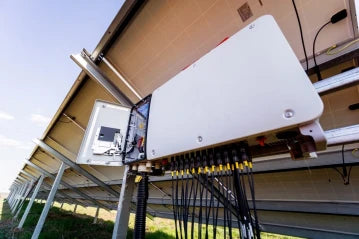
As the world embraces renewable energy sources, solar power is emerging as a popular choice for homeowners and businesses alike. Among the various components that constitute a solar energy system, the hybrid inverter holds a significant position. Hybrid inverters are versatile devices that manage the flow of electricity between the solar panels, battery storage, and the electrical grid. One question often asked by potential solar energy consumers is, "Can a hybrid inverter work without a battery?" In this blog post, we will delve into the functionality of hybrid inverters and their operation without batteries, addressing the key aspects that customers should consider when purchasing solar energy-related products.
1. Understanding Hybrid Inverters: A Brief Overview
Before we explore whether hybrid inverters can function without batteries, let's take a moment to understand their purpose and functionality. A hybrid inverter is an intelligent device that combines the features of both a grid-tied inverter and an off-grid inverter. This unique combination allows hybrid inverters to work in two primary modes: grid-tied mode and off-grid mode.
In grid-tied mode, hybrid inverters work in conjunction with the electrical grid. When your solar panels produce excess electricity, the hybrid inverter sends this surplus power back to the grid, earning you credits and reducing your electricity bills. On the other hand, in off-grid mode, the hybrid inverter allows you to disconnect from the grid and operate independently using stored energy in a battery bank. This is particularly useful in areas with unreliable grid connectivity or as a backup during power outages.
2. Hybrid Inverters Without Batteries: Operating in Grid-Tied Mode
One of the main advantages of hybrid inverters is their ability to operate without batteries in grid-tied mode. When you install solar panels and a hybrid inverter without a battery, the excess electricity generated during peak sun hours is directly fed back into the grid. This process is known as "net metering," where your utility company credits you for the surplus energy you contribute.
Operating without a battery has its benefits. Firstly, it simplifies the system setup and reduces upfront costs. Batteries can be expensive, so for budget-conscious consumers, a battery-less setup can be a practical choice. Secondly, with grid-tied systems, you don't have to worry about managing battery maintenance, replacements, or the finite lifespan of batteries. You can still significantly reduce your electricity bills and even earn money through feed-in tariffs, depending on your location.
However, it's essential to consider that without a battery, your solar system won't provide backup power during grid outages. When the grid goes down, grid-tied systems without batteries also shut down for safety reasons. If you prioritize energy independence and uninterrupted power supply, a battery option might be more suitable.
3. The Role of Batteries: Advantages and Disadvantages
As we've mentioned earlier, batteries play a crucial role in the off-grid mode of hybrid inverters, providing a means to store excess electricity for later use. Let's explore the advantages and disadvantages of incorporating batteries into your solar energy system.
Advantages:
a. Energy Independence: With batteries, you can store excess energy and use it when the sun isn't shining, ensuring a continuous power supply, even during grid outages.
b. Time-of-Use Optimization: In regions with time-of-use electricity rates, batteries allow you to store energy when rates are low and use it during peak hours, optimizing your savings.
c. Peak Shaving: Batteries can help reduce peak demand on the grid by discharging stored energy during high electricity consumption periods, which can lead to additional savings on your electricity bills.
Disadvantages:
a. Cost: The initial investment in batteries can significantly increase the overall cost of your solar system.
b. Maintenance: Batteries require regular maintenance and eventual replacement, adding to the long-term operational costs.
c. Limited Capacity: Batteries have a finite storage capacity, which means they may not be able to sustain prolonged periods of high energy demand without a grid connection.
Conclusion
In conclusion, hybrid inverters can indeed work without batteries in grid-tied mode, providing a cost-effective solution for those primarily seeking to reduce their electricity bills and contribute to a cleaner environment. By harnessing the power of the sun and feeding excess energy back to the grid, consumers can benefit from net metering programs and potential financial incentives.
However, it's essential to assess your individual energy needs and priorities when considering a solar energy system. If you value energy independence, require backup power during grid outages, or live in areas with unstable grid connectivity, incorporating batteries into your hybrid inverter setup might be the way to go. Batteries offer the advantage of energy storage, enabling you to make the most of your solar energy system and optimizing your savings.
Ultimately, the decision to use a hybrid inverter with or without batteries comes down to finding the right balance between cost, convenience, and sustainability. Before making a purchase, we recommend consulting with reputable solar energy providers to help determine the best solution tailored to your specific needs. Embracing solar power and hybrid inverter technology can be a rewarding step towards a greener future with cleaner energy consumption and reduced carbon footprints.
Remember, whether you choose a hybrid inverter with batteries or opt for a battery-less setup, every kilowatt-hour of solar-generated electricity you utilize is a step towards a more sustainable and eco-friendly lifestyle. Happy solar shopping!



0 Kommentare